Anne Lamott's Bird by Bird
Chapter 29
How do you tackle one of the most famous writing craft books? You take it “Bird by Bird.” That’s what we’ve done with Anne Lamott’s book. Over the past 12 episodes and in this final episode, we cover the last bit of advice she gives to her “final class,” along with how to avoid libel (not sure why that got placed there). We also (of course) give our opinion about the book as a whole.
And then, because there’s always another writing craft book, we reveal what we’re reading next. Drumroll please! … Judith Barrington’s Writing the Memoir. Listen to our amazing discussion about memoir writing classes with one of Renee’s favorite memoir writing instructors, Joselin Linder. If you’re writing a memoir, or even just thinking of tackling this genre, this is the interview for you!
Want to hear more of our exercise workshop? We post the bonus podcast, SnarkNotes, and detailed write up of the exercises on our Words to Write by Patreon account.
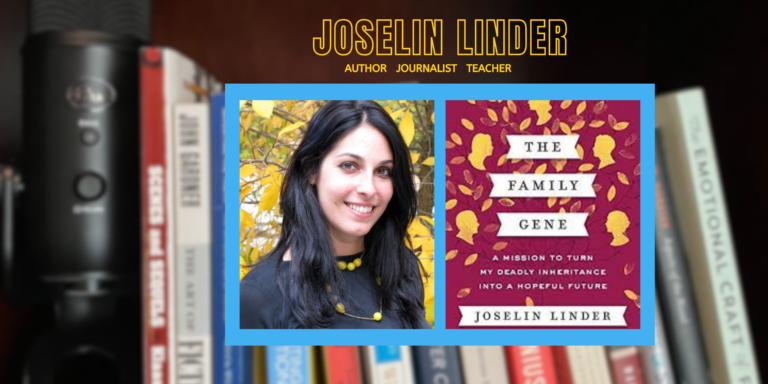
Just as we’re putting Bird by Bird back on the shelf, we’re picking up something new: Writing the Memoir by Judith Barrington. To prepare us for the Creative Non-Fiction road ahead, we talk to Joselin Linder, memoirist, journalist, and writing instructor at Gotham Writers and The Book Incubator, who has taught hundreds of students the art of writing a life story.
In this episode, Linder sheds a light on the struggles many writers face when penning a memoir, such as navigating incomplete memories, deciding what events to leave in or out for dramatic effect, and avoiding meddlesome and boring tropes.
"Our lives are like a forest. You can name all the names in a forest, but memoir is carving out a path through the forest."

Joselin Linder has written personal essays for The New York Times, articles for The New York Post, and several non fiction books. In 2017 she published her memoir, The Family Gene about a unique and deadly mutation that has affected generations of her family which you can buy here. She is also a writing instructor for The Book Incubator and Gotham Writers.
The Last Class (and The Last Chapter of 🐦⬛ x 🐦)
If you’re a teacher, then you know the feeling of “the last class.” You’ll miss the students, the comradery, the work, the journeys of each and every student. A classroom is just a temporary village after all. If you’ve ever been a teacher, you know this melancholy contradiction of feelings. However you describe it, Lamott recreates it in the last chapter of Bird by Bird, setting us free with a tearful, yet hopeful goodbye, and wishing us well on our writing adventures with just a few last pieces of advice.
Lamott's Parting Advice
First, Lamott reminds us to mine our childhoods for inspiration and material.
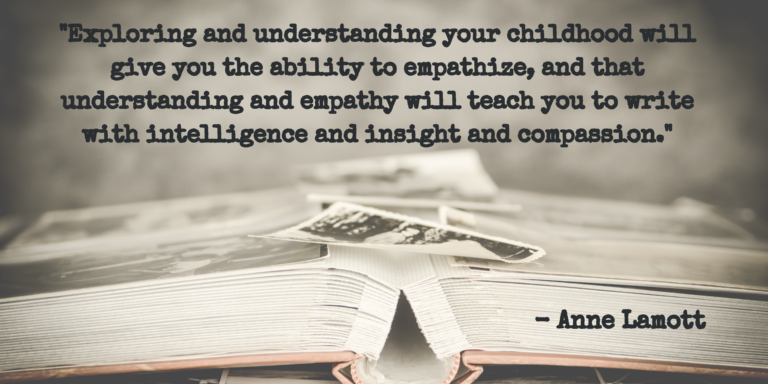
Next, she tells us to come to the page fully aware in order to reveal your truth to the reader.
“When you’re conscious and writing from a place of insight and simplicity and real caring about the truth, you have the ability to throw the lights on for your reader.”
Then, Renee's favorite.
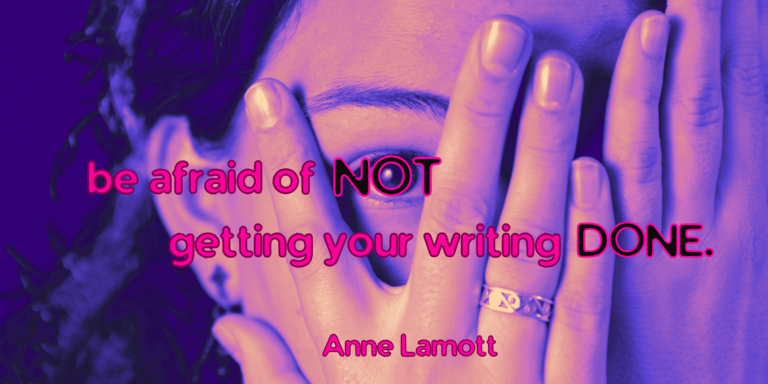
Finally, she tells us to be authentic, not distant or "fraudulent" in our writing.
Write straight into the emotional center of things. Write toward vulnerability.”
Caveat Corner: Libel
Lamott dedicates most of this last chapter to the discussion of Libel, which seems kind of weird given the book is geared towards fiction writers. Many memoirists worry about this, but, apparently, writing a tell all about your good for nothing cheating ex and calling it a “novel” won’t give you a free pass).
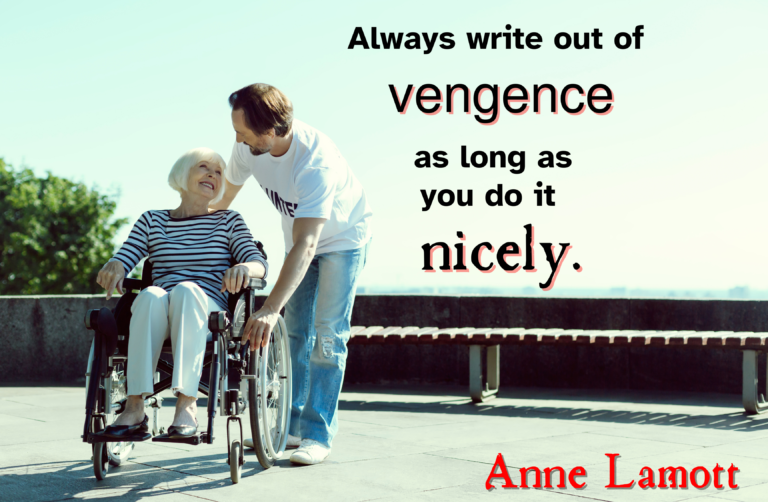
So What's a Writer to Do?
According to Lamott, turn the character, based on your real life father-in-law, into a shitty college roommate; transform your crappy mother into a composite of your least favorite teacher in elementary school; give the character based on your jerk-face ex-wife the characteristics of a mangy poodle; most importantly, if it’s about your ex boyfriend or husband, “give him a teeny little penis so he will be less likely to come forth (Lamott).
Doing all of those things will most likely prevent you from losing in court. Yes, Dear Writer, you’re entitled to the truth. However, nothing is stopping the fictionalized-real-person from hiring a lawyer and making themselves an expensive and emotional nuisance. Let’s just say writing with revenge may come with consequences.
Schadenfreude, anyone?
Bird by Bird in a Nutshell
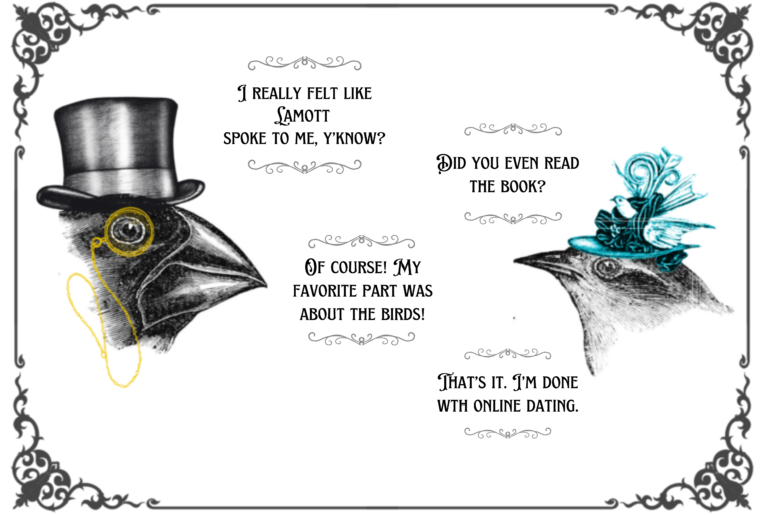
Looking back on our journey through the book as a whole, both Kim and Renee agree that the chapters in Part One, “Writing,” of Bird by Bird had the best content.
In terms of useful practical advice, we both gained valuable insights performing Lamott’s “Plot Treatment” on a chapter of our manuscripts.
If you’re looking for emotional support, we found the following chapters: “Jealousy,” “Perfectionism,” and “Shitty First Drafts” mirrored our own feelings (aka psychoses) and offered the words we needed to hear to get back to writing. With that said, both Kim and Renee agreed that the most emotionally gratifying chapter of them all was “Radio Station KFKD.” Hilarious and dripping in Lamott’s self deprecating humor (literary gold, really), she explains just how FKD we are and helps us through our darkest writing hours.
While this book did suffer a bit from the curse of Diminishing Returns, Lamott peppers the final half of the book with some worthy chapters (such as “Letters” and “Writer’s Block“) beside somewhat skimmable content (like “Finding Your Voice” and “The Moral Point of View”).
Who is Bird by Bird for, Exactly?
Just about every writer we know has heard of or owns a copy of Bird by Bird. But what kind of writer benefits most from this advice? Who, exactly, was Lamott writing to?
Heck if we know.🤷🏽♀️It’s not like we have access to that demographic data. We do, however, have some experience dissecting four writing craft books for all they’re worth over the last two years on this podcast.
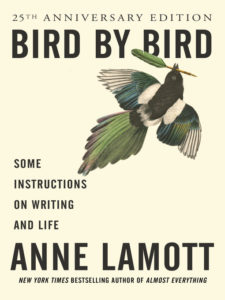
While this book is very accessible and universal (albeit occasionally outdated) in terms of advice for most writers, we found it specifically suited for the beginning or hesitant writer who needs someone to hold their hand through the painful and confusing process of writing a book.
With that said, we have noticed the style and advice across all of these books has varied wildly and seems geared for different types of writers.
In The Art of Fiction, with emphasis on teaching the traditional Western white male canon, John Gardner spoke primarily to young white male novelists with financial and cultural access to college and graduate studies.
Ray Bradbury, of course, had his fans in mind when assembling the chapters for Zen in the Art of Writing, which were an assemblage of essays, introductions to his famous books, and one interview.
From Jack Bickham’s Scene & Structure, given the amount of hard boiled, step by step procedural novel writing techniques for the whopping 75 books he wrote, we got serious Working Class Writer vibes.
So what about Bird by Bird? After reviewing sometimes dated (the book was written in the 90’s after all), oftentimes borderline woo-woo metaphysical advice, we think this book is geared toward middle aged writers newly answering the call to become an author. Given its popularity, most everyone can access it, but the middle aged crowd more so. We think the book prepares beginning writers not necessarily to publish, but to enrich their life through writing. In this way, Lamott implies that the discipline of writing down what has happened to you will in turn make you live your life more fully.
Our Next Book! Prescriptive Advice FTW!
After a whole book centered on self compassion and making us better people through writing, we’re ready for a seriously practical, unabashedly prescriptive, and strategically poignant Nuts-and-Bolts-Writing-Advice book.
Writing the Memoir: From Truth to Art
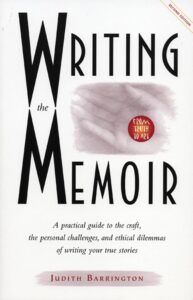
Say hello to not just a new book and a new author, but a new genre! Join us as we discuss the advice in Judith Barrington’s Writing the Memoir: A Practical Guide to the Craft, the Personal Challenges, and Ethical Dilemmas of Writing Your True Stories. Yes, Dear Writer, after four books focusing on fiction, we decided to tackle a different genre: Memoir. (Also, Renee is writing her memoir and perhaps this will get her to finish the dang thing).
Tribute: Judith Barrington
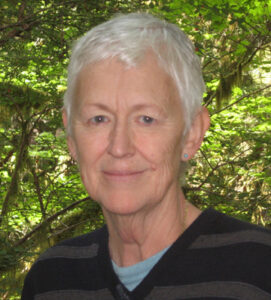
Judith Barrington is a poet and memoirist. Her most recent book of poems is Long Love: New and Selected Poems: 1985–2017. She has published five collections of poetry and two poetry chapbooks, a memoir, and a text on writing literary memoir which is used all across the United States and in Australia and Europe. Her memoir, Lifesaving, won the Lambda Book Award and was a finalist for the PEN/Martha Albrand Award for the Art of the Memoir.
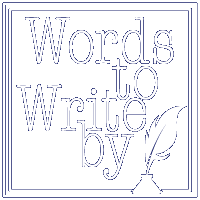


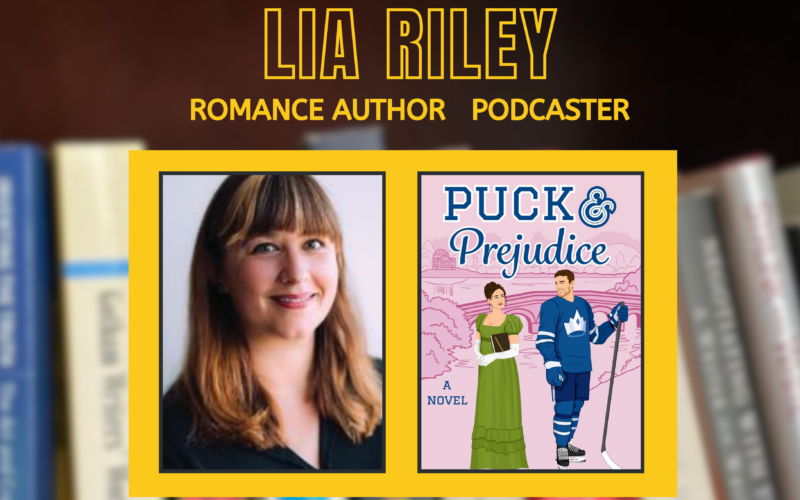
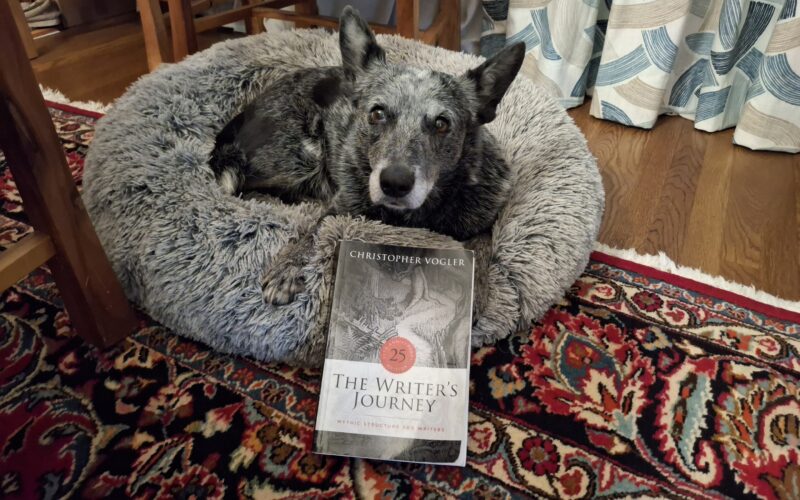
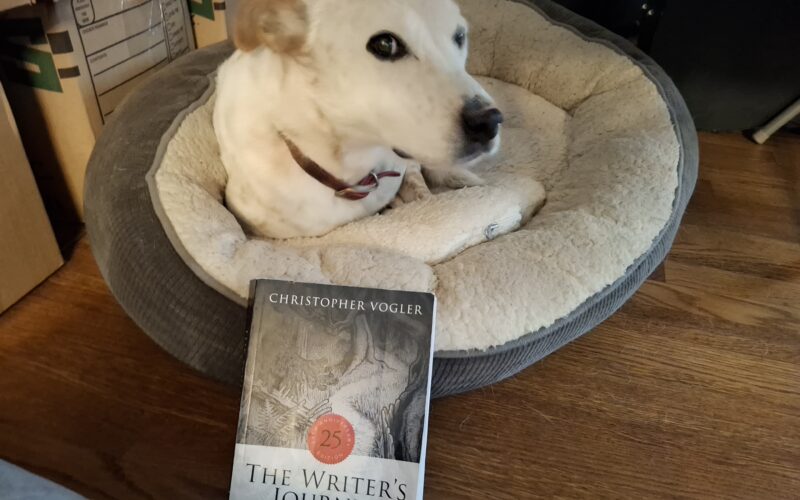
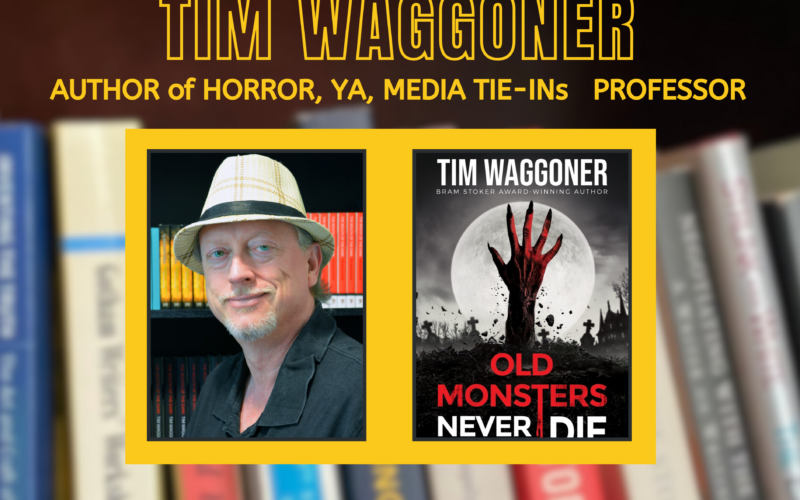
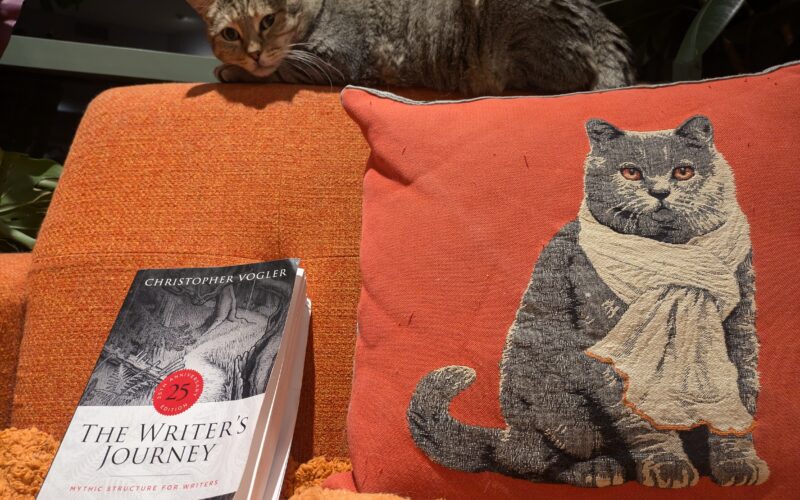
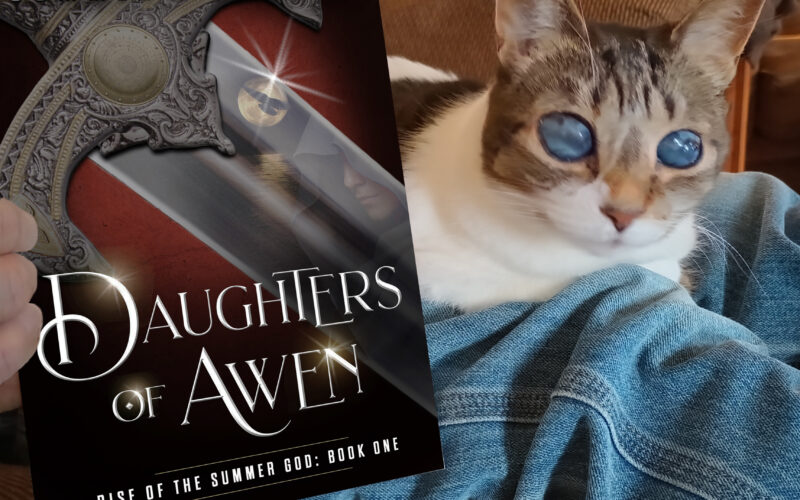

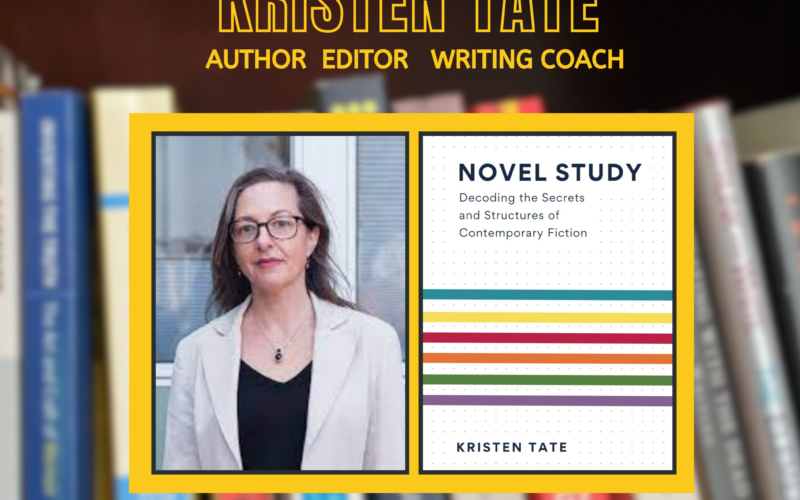

AI & Authorship: Where’s the Line?
Authors & AI SeriesEpisode 6: AI & Authorship: Where’s the Line? We’ve explored AI as brainstorming allies, critique partners, and research assistants. Now we’re tackling the most contentious question:...